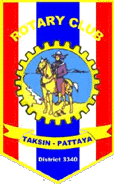|
Spirits are appeased in Naklua & Sriracha, as the communities observe ancient “Kong Khao” (Rice Festival)
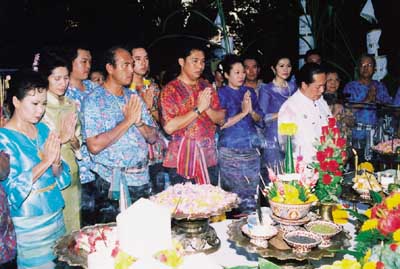
Sonthaya
Khunpluem (center), minister of science, technology and environment
presided over the Kong Khao opening ceremonies in Sriracha.
Communities in Naklua and Sriracha celebrated their
annual Rice Festival on April 20, and observed the ancient, ghoulish
customs of appeasing the sprits that same night.
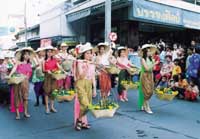
Our
loveliest maidens bring their best food and desserts to appease the
spirits in Sriracha.
The annual Kong Khao Custom follows an ancient belief
that in order to have a successful year, one must pay respects to
wandering spirits that have no living relatives. The custom of appeasing
the spirits is thought to bring good luck and prosperity to the community.
Chonburi is the only province in the country where the
annual rice appeasement ceremony is held. In the past, the festival would
include inviting a spirit to enter a selected body at the Chonburi City
Pillar Spirit Domicile for three continuous days.
 Naklua’s
best sharpshooters take aim in the slingshot competition. Naklua’s
best sharpshooters take aim in the slingshot competition.
In the Naklua and Nong Prue areas of Banglamung
District, Pattaya Mayor Pairat Suttithamrongsawat presided over the
opening ceremonies. During the day, the celebrations included a karaoke
singing contest, sling-shot shooting competitions and a tug-o-war.
In Sriracha, the ceremony was held around the Koh Loy
(Floating Island) area, as well as in front of the Sriracha municipality
office.
 Friends
from the West enjoyed our unique festival in Sriracha. Friends
from the West enjoyed our unique festival in Sriracha.
This year in Sriracha, traditional activities such as
‘Tap Chak boxing’, traditional cock fighting, cultural music,
improvised Thai Music, and the Miss Rice Festival contest were revived.
Traditional sports like sword and baton fighting were also demonstrated,
and the Eastern Seaboard Muay Thai Marathon and the customary cuisine
contest were held.
Sriracha’s traditional rice parade began at 3:00 p.m.
with floats, long drums, and marchers in traditional dress from 30
communities, and was over 2 kilometers long.
 Waking
up the spirits with long drums in the Sriracha Kong Khao parade. Waking
up the spirits with long drums in the Sriracha Kong Khao parade.
In both Naklua and Sriracha, the Kong Khao ceremonies
began at about 6 p.m. when young and old, rich and poor flocked to the
area dressed as frightening spirits and lost wandering souls. They then
circled the ceremonial location where foods and desserts had been set out
for them.
 Local
and visiting schoolchildren take part in the festivities in Naklua,
dressing up in their most “ghostlike” costumes. Local
and visiting schoolchildren take part in the festivities in Naklua,
dressing up in their most “ghostlike” costumes.
As the skies darkened above, the spirits slowly moved
in on the prepared foods and either devoured their selections on the spot
or wrapped up the delectable delights and cheerfully returned to their
spiritual abodes.
Once the spirits have been appeased, the community
members joyfully sit down and devour the remaining foods with the feeling
that the rest of the year will be free from unseen antagonists.
St Andrews Summer Camp in full swing
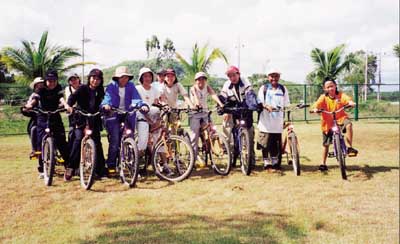
Getting
set to tackle the countryside by mountain bike.
St. Andrews International School near Rayong, in
conjunction with the Asian University of Science and Technology, is
currently full of life with its two English Summer Camps for eight to
thirteen year olds.
The two camps run over two, four-week periods and with
one successfully completed, the second is now in full swing.
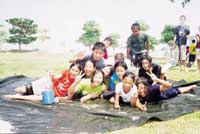 The
Summer Campers take time out to cool off with a little Songkran fun. The
Summer Campers take time out to cool off with a little Songkran fun.
Whilst the priority is for the students to improve
their English skills, they have also been involved in a wide variety of
additional activities. These have included swimming, baseball, football,
canoeing, horse riding, golf, music, team building, volleyball, mountain
biking, basketball and art. They have also gone on weekly excursions to
local attractions including Nong Nooch Tropical Gardens, Ripleys and the
Tiger Zoo. In the evenings the children are still kept busy with games,
quizzes, karaoke, singing and theme parties.
Run by a specialist team of English teachers and
activity instructors, the camps have proved a great success with the
children and their parents. The team has been praised for the
professionalism and attention to detail, especially when it comes to
safety. Selected for their qualifications, experience and imagination, the
teachers have used lots of different games and activities to ensure that
the students learn English in a fun and challenging environment. Mark
McTaggart, one of the English teachers said, “Whilst working on the
Summer Camp is very hard work and long hours, I have loved every minute of
it and find the enthusiasm of the children very rewarding.”
 Canoeing
- great exercise and one of the many activities at the camp. Canoeing
- great exercise and one of the many activities at the camp.
The non-teaching staff has also worked extremely hard
in setting up the camps and keeping them running smoothly. If it weren’t
for their dedication, the camps would not be the success they are.
Whilst it took some children a while to settle in and
there were the inevitable bouts of home-sickness, by the end of the first
camp none of them wanted to leave and saying goodbye was an emotional and
sometimes tearful event.
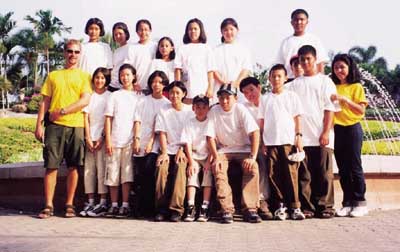
St
Andrews English Summer Camp for eight to thirteen year olds is in full
swing.
The students are expected to assist with the running of
the camps and with the domestic chores around the campus. Whilst they have
certainly been able to improve their English, they have also been able to
improve their social skills, make new friends, learn new skills and find a
little more out about themselves as individuals.
The main philosophy of the camp has been that the more
the children are prepared to put into their stay, the more they will take
away. Without exception, all the students have been putting in 101% effort
into making the camp a success and it is hoped that they took away much
more than they were expecting at the beginning.
Adam Scribbans, Head of Summer Camp said, “A big
thank-you to all the team and students of Summer Camp 2002 for all their
hard work and dedication that has made it such an outstanding success.”
Graham Sullivan joins St. Andrews group to spearhead expansion
Graham Sullivan, the former principal of Bangkok Patana
School has recently joined the St. Andrews Group in Thailand as its new
director of education. Before taking up his new assignment at St. Andrews,
Mr. Sullivan was chief executive officer of the International School of
Tanganyika (IST) in Tanzania, the largest and most well-known
international school on the African continent.
In welcoming Mr. Sullivan to the group, Bob Kennett,
the managing director of St. Andrews International Schools in Thailand
said, “I am delighted that Graham decided to join us. He has extensive
experience in the field of education, and will be able to add a fresh
dimension to help realise St. Andrews’ ambitious development plans.”
 Janet
Wong, chairperson of PTG, together with the head of the school, Jill
Thomas and the managing director, Bob Kennett, welcomes Graham Sullivan on
behalf of all the parents. Janet
Wong, chairperson of PTG, together with the head of the school, Jill
Thomas and the managing director, Bob Kennett, welcomes Graham Sullivan on
behalf of all the parents.
The St. Andrews Group currently has four schools in
Thailand. Three of these schools are located in Bangkok and the fourth is
located in Green Valley, Rayong. All the schools have a homely, friendly
environment in which students receive a quality education in
well-resourced surroundings. The group’s philosophy is to offer
multi-campuses of small to medium sized schools and the intention is to
open more sites around Thailand in the next few years.
Mr. Sullivan, a former UK senior inspector of education
in Sussex, England, will advise each of the campuses on their delivery of
the UK curriculum in order to ensure the highest quality of education
across all the schools.
Graham applied his extensive educational experience and
knowledge to Bangkok Patana School when he became principal in 1992. At
that time, Patana was a small primary school with fewer than 500 children.
During his eight years at the helm, the school grew to over 1500 students
aged 3 - 18 and gained the international standing that it now enjoys. He
attributes much of Bangkok Patana’s success during that period to the
mutual roles that he and Mr. Kennett played when Bob Kennett was chairman
of the Bangkok Patana Board of Governors during his first five years as
principal.
An adviser to the Rayong campus when it was designed
and established in 1996, Graham has always retained an interest in its
development. He was formally welcomed by the staff and parents of the
Rayong campus during their recent parent-teacher meeting on March 13 th.
“I am delighted to join the St. Andrews Group as its
director of education,” remarked Mr. Sullivan. “Each campus has highly
trained professionals. In my experience, the quality of education
delivered in all the schools matches the best that is available anywhere
in the world. This is a very exciting and challenging time for me to be
here due to the exciting new developments that are currently being planned
for the future,” he added.
Madrid World Assembly on Ageing and Intergenerational Solidarity
by Dr Ioan Voicu,
Visiting Professor, Assumption University of Thailand
On all continents there are strong appeals for
attaching more attention to the specific requirements of the older
generation during the irreversible process of globalization. This is quite
normal. There is no doubt that the ageing of the global population is one
of the fundamental characteristics of our times. Population ageing in the
last 50 years is the result of the combination of increased life
expectancy and low fertility rates. As compared to 1982, when ageing was
obvious in developed countries, in 2002 the majority of older persons live
in developing countries. The recent Second World Assembly on Ageing
(Madrid, 8-12 April 2002) as dedicated to that group of issues, being an
important event within the general framework of the United Nations
multilateral diplomacy.
The International Plan of Action on Ageing, which was
adopted at the First World Assembly in Vienna in 1982, in the preparation
of which I was actively involved, has guided the thinking and action on
ageing over the past 20 years. However, great and visible demographic
transformations are currently taking place, and by the middle of this
century the old and the young are expected to represent equal shares of
the world population. Globally, the proportion of persons aged 60 years
and older is expected to double between 2000 and 2050. The greying
population phenomenon is also affecting Thailand. By the year 2019, the
number of Thai people over the age of 65 will rise to 10.7 million or 15.3
percent of the total population.
173 speakers took the floor in the five-day general
exchange of views in the Madrid Conference, including 142 government
delegations, four representatives of the United Nations family, 17
non-governmental organizations, five intergovernmental organizations. Four
heads of state and government, one vice-president and 48 ministers
attended the assembly.
A Political Declaration and a new Plan of Action were
adopted by consensus by the Madrid Conference, in the officially
proclaimed context of “a society for all ages”, illustrating a
concerted effort to address the “demographic revolution” that is
taking place all over the world. The letter and the spirit of the
documents deserve to be well known and assimilated in all countries.
The two documents call for changes in attitudes,
policies and practices at all levels, in all sectors, so that the enormous
potential of ageing may be fulfilled. Four dimensions are covered:
individual lifelong development; multi-generational relationships; the
interrelationship between population ageing and development; the situation
of older persons. 117 concrete recommendations for action in three
priority areas were formulated: development for an ageing world, advancing
health and well-being into old age, and ensuring an enabling and
supportive environment.
Among the specific issues discussed in Madrid, one was
crucial: the abuse of older persons. Perceptions of such abuse vary
between groups across and within societies. One definition reads: “a
single or repeated act, or lack of appropriate action occurring within any
relationship where there is an expectation of trust, which causes harm or
distress to an older person”. Four categories of abuse have been
identified: physical abuse, emotional abuse, financial exploitation and
neglect. Other possible forms of abuse include: sexual abuse, spousal
abuse, medication abuse, abandonment or desertion, loss of respect,
systemic abuse, economic violence, scapegoating, social or domestic
violence, community violence, political violence and armed conflict, and
HIV/AIDS related violence.
Potential responses about how to fight the abuse of
older persons have focused among other things on: public awareness
programmes, new legislation, judicial action and intervention and
prevention programmes. More specific measures may be envisaged like
regulation of care, better identification of cases, care and treatment
planning. Basic principles for guiding appropriate intervention encompass
ethical concerns, human rights and values, freedom, autonomy, justice,
accountability, privacy, respect and dignity. It sounds cogent and very
humanistic!
The official UN reports show that the demographic
changes are expected to be the greatest and most rapid in developing
countries, where the older population is expected to quadruple by 2050.
Therefore, the Assembly recognized the importance of placing ageing in the
context of strategies for the eradication of poverty, as well as efforts
to achieve full participation of all developing countries in the world
economy. The texts promoted a new recognition that ageing was not simply
an issue of social security and welfare but of overall development and
economic policy. They also stressed the need to promote a positive
approach to ageing and overcome the negative stereotypes associated with
it.
A primordial issue addressed in the texts is
intergenerational solidarity. The Political Declaration recognized the
need to strengthen solidarity among generations, and intergenerational
partnerships, keeping in mind the particular needs of both older and
younger ones, and encourage mutually responsive relationships between
generations. The Plan of Action is more specific in that stressing
solidarity between generations at all levels - in families, communities
and nations - is fundamental for the achievement of a society for all
ages. Solidarity is also a major prerequisite for social cohesion and a
foundation of formal public welfare and informal care systems. Changing
demographic, social and economic circumstances require the adjustment of
pension, social security, health and long-term care systems to sustain
economic growth and development and to ensure adequate and effective
income maintenance and service provision. In pragmatic terms, it is
acknowledged that at the family and community level, intergenerational
ties can be valuable for everyone. Despite geographic mobility and other
pressures of contemporary life that can keep persons apart, the great
majority of persons in all cultures maintain close relations with their
families throughout their lives. These relationships work in both
directions, with older persons often providing significant contributions
both financially and, crucially, in the education and care of
grandchildren and other kin. All sectors of society, including
governments, should aim to strengthen those ties.
Nevertheless, the Plan of Action says, it is important
to recognize that living with younger generations is not always the
preferred or best option for older persons. While formulating the general
objective of strengthening solidarity through equity and reciprocity
between generations, the following actions are recommended in order to:
(a) Promote understanding of ageing through public education as an issue
of concern to the entire society; (b) Consider reviewing existing policies
to ensure that they foster solidarity between generations and thus
promoting social cohesion; (c) Develop initiatives aimed at promoting
mutual, productive exchange between the generations, focusing on older
persons as a societal resource; (d) Maximize opportunities for maintaining
and improving intergenerational relations in local communities, inter alia,
by facilitating meetings for all age groups and avoiding generational
segregation; (d) bis. Consider the need to address the specific situation
of the generation that has to care at the same time for their parents,
their own children and grandchildren; (e) Promote and strengthen
solidarity among generations and mutual support as a key element for
social development; (f) Initiate research on the advantages and
disadvantages of different living arrangements for older persons,
including familial co-residence and independent living in different
cultures and settings.
Intergenerational solidarity proved to be a most
interesting issue considered by the Madrid World Assembly on Ageing.
Therefore, while summing up the work of the Assembly, its President Ex
Officio, Juan Jose Lucas, Minister of the Presidency of the Government of
Spain, emphasized the link between the past, the present and the future
that older persons represented. The Plan of Action was more than just a
catalogue of good intentions - it was a framework of development and
combating poverty, which emphasized the importance of active ageing, of
intergenerational solidarity and the necessity of helping developing
countries.
As a general conclusion it can be asserted that ageing
is not a problem, but an achievement. The revolutionary demographic
challenge of the current century, in both developed and developing
countries, demands that concerted and strong efforts be made for putting
ageing policies at the top of the social agenda during the irreversible
process of globalization. All people in all countries from every sector of
society, individually and collectively, are invited to join in a universal
dedication to a shared vision of equality for persons of all ages. That is
the humanistic message from Madrid.
BCCT enjoys successful networking evening in Map Ta Phut
The British Chamber of Commerce Thailand (BCCT) held
it’s first networking evening in Map Ta Phut in over two years last
Friday evening, April 26.
 Katoen
Natie MD Jim Howard with his pride and joy. Katoen
Natie MD Jim Howard with his pride and joy.
The response was outstanding, as more than 60
businesspeople from Map Ta Phut, elsewhere in the Eastern Seaboard and
Bangkok enjoyed a great evening of networking - despite a few highly
suspect direction maps.
Lead sponsors Katoen Natie Sembcorp (Thailand) Ltd.,
the Belgian logistics company led by managing director Jimmy Howard
ensured plentiful supplies of food and liquid refreshment. Jimmy Howard
also organised for one of the company’s trucks to come down for a
working demonstration.
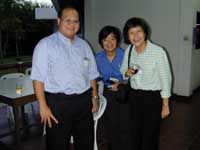 BCCT
friends at KLM pictured with BCCT Eastern Seaboard Committee member
Suwannah Viroonchan of the Travel Clinic. BCCT
friends at KLM pictured with BCCT Eastern Seaboard Committee member
Suwannah Viroonchan of the Travel Clinic.
Jimmy Howard received great support from Suwannah
Viroonchan of the Travel Clinic. Suwannah also persuaded the airline KLM
to come to the event. KLM supplied numerous prizes and discounts via
scratchcards to add to the enjoyment.
Kasemsri Homchean, manager of the Map Ta Phut
Industrial Estate Office, was a generous and accommodating host.
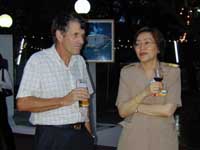 Map
Ta Phut Industrial Estate Office Manager Kasemsri Homchean (right) talking
to Dow Chemical MD Richard Smith. Map
Ta Phut Industrial Estate Office Manager Kasemsri Homchean (right) talking
to Dow Chemical MD Richard Smith.
Graham Macdonald, chairman of the BCCT on the Eastern
Seaboard, said that the night was a resounding success. “This is the
first time the BCCT has come down here for quite a while now. A few of our
members were complaining that they always had to travel to Pattaya or
further to get to the networking evenings. So, Jimmy Howard suggested that
we use the facilities on the Map Ta Phut Industrial Estate. As you can see
they really are quite excellent and can cater for even more people than
have attended tonight as well as being able to host seminars and lectures.
The response from our members and local businesses has been excellent and
we will definitely be back in the near future.”
 Members
of the BCCT’s Eastern Seaboard Committee in triplicate - Chairman Graham
Macdonald (left), Paul Dobbs (middle) and sponsor Jim Howard (right). Members
of the BCCT’s Eastern Seaboard Committee in triplicate - Chairman Graham
Macdonald (left), Paul Dobbs (middle) and sponsor Jim Howard (right).
Yet again, the BCCT has proved that it is prepared to
look after and cater for all types of business throughout the whole of the
Eastern Seaboard.
BCCT hopes to arrange more events on the Eastern
Seaboard and looks forward to more representatives from the Map Ta Phut
and Ban Chang areas joining these occasions. Special thanks to Katoen
Natie, IEAT and KLM for their support.
The next BCCT Networking Evening will be at the end of
May at the Royal Cliff. The exact date will be published in the Pattaya
Mail shortly.
Debut of a new Star Cruise Ship
By Gary Hacker
 The
majestic cruise ship “Superstar Capricorn” has just begun sailing from
the newly built Star Cruise Terminal at Laem Chabang. The
majestic cruise ship “Superstar Capricorn” has just begun sailing from
the newly built Star Cruise Terminal at Laem Chabang.
The majestic cruise ship “Superstar Capricorn” has
just begun sailing from the newly built Star Cruise Terminal at Laem
Chabang. Note to all expats living in Pattaya and surroundings: hey guys,
this is a great way to spend three days cruising out on the Gulf, visiting
luscious undeveloped islands and leaving the Kingdom to renew your visa.
You will be amazed at the price and yes, you can take your lady along on
the adventure. For the vacationing family, this is a great way to make
your Thailand experience one that you will always remember.
I boarded at 4 in the afternoon traveling alone, with
my goal to complete a business report that was long overdue. I had sailed
before on California Cruise Ships but only once before in Asia. The
magnificence of the Superstar Capricorn is overwhelming. The large white
ship has 435 cabins with a lower berth capacity of 700 passengers and a
crew of about the same number. All cabins face out onto the sea and
several of the upper cabins have their own private outside deck. I needed
motivation to finish this complicated report and I thought the isolation
of this 3 day 2 night cruise to Cambodia and Koh Chang might provide it.
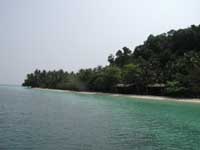 Stopping
to enjoy the pleasures of a day on a secluded beach. Stopping
to enjoy the pleasures of a day on a secluded beach.
All meals are included aboard and you can eat as much
as you like four times a day. Extravagant live shows are featured every
night in the “Galaxy of the Stars”, which even features a colorful
performance by the Alcazar Cabaret Dancers. My plans were to skip the
shows and spend the time in my cabin polishing my presentation. The plans
further included curling up on a deck chair in the afternoon and maybe
even spending a few hours around one of the two pools aboard.
A daily program outlining the activities aboard is slid
under the cabin door each day. Should I spend the evening dancing in the
Disco Lounge, enjoy sushi and a cocktail at the Sushi Bar or watch another
extravagant show? A good movie was scheduled; bingo in the Galaxy of the
Stars and a karaoke competition in the Karaoke Hall was listed. I elected
to find a seat in the library, order a cocktail, listen to the gentle
piano music and work on my business report.
 Extravagant
live shows are featured every night in the “Galaxy of the Stars”,
which even features a colorful performance by the Alcazar Cabaret Dancers. Extravagant
live shows are featured every night in the “Galaxy of the Stars”,
which even features a colorful performance by the Alcazar Cabaret Dancers.
The last night aboard, I wandered up to the front deck.
There was a warm ocean breeze as the ship gently made its way through the
sea on our way back to Laem Chabang. I strolled around the windward side
and looked out at the twinkling lights abreast Rayong. The moon glistened
across the Gulf of Siam. I couldn’t help thinking how lucky I am to be
living in Thailand.
The Superstar Capricorn offers fares for a deluxe upper
deck outside stateroom at about 10,300 baht for the 3 day 2 night cruise
and also offers 4 and 5 day cruises to Cambodia and Viet Nam. Star
Cruises, tel. 02-634-8255.
|





 Naklua’s
best sharpshooters take aim in the slingshot competition.
Naklua’s
best sharpshooters take aim in the slingshot competition. Friends
from the West enjoyed our unique festival in Sriracha.
Friends
from the West enjoyed our unique festival in Sriracha. Waking
up the spirits with long drums in the Sriracha Kong Khao parade.
Waking
up the spirits with long drums in the Sriracha Kong Khao parade. Local
and visiting schoolchildren take part in the festivities in Naklua,
dressing up in their most “ghostlike” costumes.
Local
and visiting schoolchildren take part in the festivities in Naklua,
dressing up in their most “ghostlike” costumes.
 The
Summer Campers take time out to cool off with a little Songkran fun.
The
Summer Campers take time out to cool off with a little Songkran fun. Canoeing
- great exercise and one of the many activities at the camp.
Canoeing
- great exercise and one of the many activities at the camp.
 Janet
Wong, chairperson of PTG, together with the head of the school, Jill
Thomas and the managing director, Bob Kennett, welcomes Graham Sullivan on
behalf of all the parents.
Janet
Wong, chairperson of PTG, together with the head of the school, Jill
Thomas and the managing director, Bob Kennett, welcomes Graham Sullivan on
behalf of all the parents. Katoen
Natie MD Jim Howard with his pride and joy.
Katoen
Natie MD Jim Howard with his pride and joy. BCCT
friends at KLM pictured with BCCT Eastern Seaboard Committee member
Suwannah Viroonchan of the Travel Clinic.
BCCT
friends at KLM pictured with BCCT Eastern Seaboard Committee member
Suwannah Viroonchan of the Travel Clinic. Map
Ta Phut Industrial Estate Office Manager Kasemsri Homchean (right) talking
to Dow Chemical MD Richard Smith.
Map
Ta Phut Industrial Estate Office Manager Kasemsri Homchean (right) talking
to Dow Chemical MD Richard Smith. Members
of the BCCT’s Eastern Seaboard Committee in triplicate - Chairman Graham
Macdonald (left), Paul Dobbs (middle) and sponsor Jim Howard (right).
Members
of the BCCT’s Eastern Seaboard Committee in triplicate - Chairman Graham
Macdonald (left), Paul Dobbs (middle) and sponsor Jim Howard (right). The
majestic cruise ship “Superstar Capricorn” has just begun sailing from
the newly built Star Cruise Terminal at Laem Chabang.
The
majestic cruise ship “Superstar Capricorn” has just begun sailing from
the newly built Star Cruise Terminal at Laem Chabang. Stopping
to enjoy the pleasures of a day on a secluded beach.
Stopping
to enjoy the pleasures of a day on a secluded beach. Extravagant
live shows are featured every night in the “Galaxy of the Stars”,
which even features a colorful performance by the Alcazar Cabaret Dancers.
Extravagant
live shows are featured every night in the “Galaxy of the Stars”,
which even features a colorful performance by the Alcazar Cabaret Dancers.


